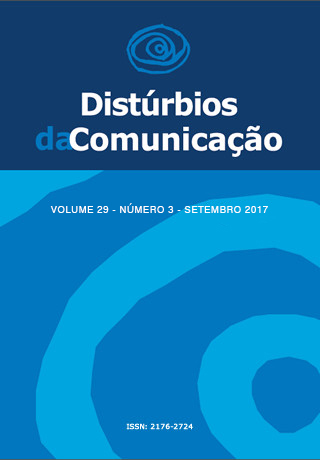Intervenção fonoaudiológica precoce em afasia infantil decorrente de um acidente vascular cerebral: relato de caso
DOI:
https://doi.org/10.23925/2176-2724.2017v29i3p480-486Palavras-chave:
Fonoaudiologia, Linguagem, Acidente Vascular Cerebral, CriançasResumo
O Acidente Vascular Cerebral é menos frequente em crianças do que em adultos, porém possui um poder devastador para o futuro destes indivíduos, mesmo com indícios de melhor recuperação das alterações. O objetivo deste estudo é descrever os achados fonoaudiológicos de um caso de Acidente Vascular Cerebral infantil, evidenciando a evolução após 12 meses de terapia fonoaudiológica, iniciada precocemente, após lesão neurológica adquirida. Trata-se de um indivíduo de 11 anos, gênero masculino, com normalidade de desenvolvimento neuropsicomotor e independência para as atividades funcionais durante a primeira infância. Em março de 2015 sentiu um mal súbito, foi encaminhado para o hospital de urgência e diagnosticado com Acidente Vascular Cerebral, do tipo hemorrágico, em região fronto-parietotemporal esquerda. Foram realizados procedimentos cirúrgicos, e a internação durou 25 dias. No momento da alta hospitalar houve a orientação sobre a necessidade de atendimento fonoaudiológico. A primeira avaliação de linguagem evidenciou afasia adquirida do tipo emissiva, conforme as classificações propostas para crianças. Foram realizadas 91 sessões de terapia fonoaudiológica, com duração de 50 minutos, pelo período de 12 meses. Ao analisar as habilidades formais de linguagem que permaneceram alteradas, observa-se que as relacionadas à leitura e escrita são as de maior significância, interferindo no desempenho escolar e desenvolvimento comunicativo. Assim, além do atendimento fonoaudiológico até que seja possível uma comunicação funcional, é importante que haja o apoio escolar.
Downloads
Downloads
Publicado
Edição
Seção
Licença
Copyright (c) 2017 Natalia Caroline Favoretto, Natalia Gutierrez Carleto, Paula Grandini Cunha, Vanessa Clivelaro Bertassi Panes, Adriano Yacubian Fernandes, Dionísia Aparecida Cusin Lamônica, Magali de Lourdes Caldana

Este trabalho está licenciado sob uma licença Creative Commons Attribution 4.0 International License.









